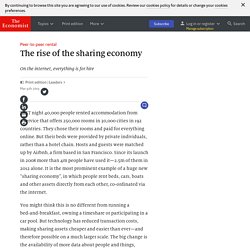

Telstra Peer To Peer Sharing Crackdown. Opinion Telstra ... set to start a controversial new trial that will slow down P2P speeds.

Photo: Glenn Hunt Bypassing Telstra's P2P crackdown is child's play Telstra BigPond customers – especially those downloading a lot of pirated content – may soon notice their internet speeds dropping, courtesy of a trial the telco is conducting to, it says, improve its network. The trial will see the internet speeds of BigPond ADSL customers who choose to share content via peer-to-peer networks deliberately slowed down, known as throttling, during peak periods. While it is true that a lot of content downloaded over these networks is pirated material including music, movies and software; there is a lot of content that isn't.
Advertisement Leaving the piracy issue aside, what gives internet service providers the right to selectively filter content and manipulate speeds based on that? But what if Telstra isn't necessarily prioritising its own services, what if it's just trying to play internet police? News, research and discussion on virtual goods, currencies and economies globally. Why is eBay banning the sale of online-game virtual assets?" Massive multiplayer online games (MMOGs) like World of Warcraft and EverQuest claim millions of players around the world.

All of these people pay to play, and they spend their time collecting valuable points, artifacts and countless other goods that serve three primary purposes: They make the player feel happy; they allow the player to trade or sell within the online-game marketplace for other goods or services he or she wants or needs; they increase the value of the player's game character. MMOGs have been around for years, and people spend countless hours online building up their characters' net worth.
What they do with this value tends to stay within the game world itself; however, a more recent development has brought this virtual value into the real-world economy. In the last five years or so, "virtual property" has started showing up on online marketplaces like eBay, where it is sold for real-world money. So is that the reason for the ban? Terdiman, Daniel. Journal of Peer Production. P2P production. Start-ups Changing Collaborative Consumption.
Airbnb found itself in a public relations nightmare this summer that threatened to undermine its whole ethos of amiable and unique person-to-person connections.

Gawker published an account of a user of the start-up vacation-property rental site whose home was ransacked by a vistor who destroyed property, rummaged through her personal belongings, and set fire to sheets. The incident had some wondering if the site was doing enough to protect its users as it facilitates transactions between strangers. 7 Start-ups Changing Peer-to-Peer Commerce. It's one thing to buy a vintage lamp on Craigslist, but in the wake of the Airbnb home-vandal scandal, would you rent a stranger your SUV or office desk?

These seven start-ups are betting that, with added security from insurance and online transparency, you sure will. They're targeting hard-to-disrupt industries (travel, hotel, and auto-rental) by enabling people to buy and rent directly from one another. Here's how it works. Location: Brooklyn, New YorkFounder: Campbell McKellarHow it Works: Loosecubes matches people with an extra desk, studio, or office space with independent workers looking for a place to be productive.How it Makes Money: Hosts are charged a 10 percent fee for each transaction.By the Numbers: Loosecubes now offers spaces in 535 cities in 66 countries, making it the largest community marketplace for shared workspace in the world. Peer to Peer File Sharing - P2P Networking. Peer-to-peer (P2P) networking eliminates the need for central servers, allowing all computers to communicate and share resources as equals.

Music file sharing, instant messaging and other popular network applications rely on P2P technology. What Is P2P? P2P is a standard approach to network design that eliminates the need for dedicated servers. P2P is also a popular term for freely available Internet file sharing software systems. P2P Software Progams and Networks TutorialPeer to peer networks comprise both peer workgroup LANs and P2P file sharing networks. Free Software - P2P File Sharing ProgramsThis index describes each of the top peer to peer file sharing client software programs.
Free P2P Music and Movie Download TipsVarious technical difficulties can interfere with P2P download activity. Peer-to-peer rental: The rise of the sharing economy. LAST night 40,000 people rented accommodation from a service that offers 250,000 rooms in 30,000 cities in 192 countries.

They chose their rooms and paid for everything online. But their beds were provided by private individuals, rather than a hotel chain. Hosts and guests were matched up by Airbnb, a firm based in San Francisco. Since its launch in 2008 more than 4m people have used it—2.5m of them in 2012 alone. It is the most prominent example of a huge new “sharing economy”, in which people rent beds, cars, boats and other assets directly from each other, co-ordinated via the internet.